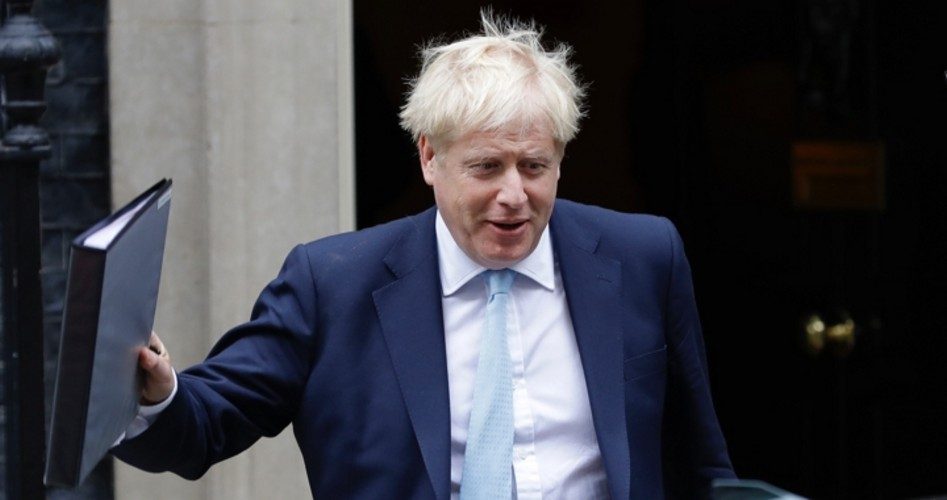
Podcast: Play in new window | Download ()
Subscribe: Android | RSS | More
Less than two weeks after Supreme Court judges in the U.K. voided a Royal Proclamation proroguing Parliament, Prime Minister Boris Johnson has announced plans to prorogue Parliament again next week. This time, the suspension will be for a much shorter time period.
On September 23, the U.K. Supreme Court ruled unanimously that the original suspension was “unlawful.” Parliament was back in session the next day.
“The Prime Minister has been consistently clear that he wants to set out a fresh legislative program in a Queen’s Speech,” Number 10 Downing St. reported.
“He therefore intends to request that the current session of Parliament be prorogued from the evening of Tuesday, October 8, with a Queen’s Speech on Monday, October 14.”
The Queen would have to approve of the new suspension, but that is considered a mere formality.
While the move should be less controversial than the five-week suspension announced in early September, even a short, less than one week, stoppage of Parliament at such a sensitive time in British politics is certain to ruffle some Remainer feathers.
Labour Party leader Jeremy Corbyn thinks that any suspension of Parliament has to be a short one in order for the House of Commons to keep an eye on the Brexit situation. Great Britain is still scheduled to leave the European Union in less than a month — on October 31.
“I think we should have the shortest possible gap between the end of this parliamentary session and the start of a new one,” Corbyn said on Wednesday. “I think Parliament needs to be in session to question this government and to prevent us leaving the EU without a deal.”
Corbyn then parroted Remainer concerns about the supposed economic chaos that could occur in the U.K. and Europe in event of a no-deal Brexit. “Leaving without a deal will be very, very damaging to trade, to medical supply, to jobs and to exports from this country,” Corbyn complained.
Should Parliament be suspended next Tuesday as planned, the Prime Minister’s Questions, or PMQs, would not be held next week, since they are normally held on Wednesdays. But while Parliament would not be able to directly question the prime minister, Johnson’s new proposal to the EU has already been unveiled, so the House of Commons will, presumably, have until Tuesday to debate its merits.
Upon their return, Parliament will have until October 17 to poke holes in Johnson’s deal. On that date, the European Council will meet to discuss a number of topics, foremost among them Brexit and Johnson’s proposed deal.
Thus far, the EU’s reaction to Johnson’s proposed deal has not been positive. Michel Barnier, chief Brexit negotiator for the EU, is said to have privately savaged Johnson’s proposal, while publicly saying that Johnson’s “polarizing” behavior has created a “low chance” for any deal to pass through Parliament anyway.
Ireland, specifically the border between the Republic of Ireland — an EU member — and Northern Ireland — a part of the U.K. — remains the stated sticking point between the two sides. Johnson’s plan calls for Northern Ireland to leave the EU along with the rest of Great Britain after a transition period. It is the EU’s position that this would necessitate “checkpoints” along the border — a situation neither the Republic of Ireland nor Northern Ireland want.
The U.K. has requested that a treaty-level agreement be made “never to conduct checks at the border.”
Barnier claimed, “The EU would then be trapped with no backstop to preserve the single market after Brexit.”
In a call with Johnson, Irish leader Leo Varadkar said that the proposal “does not fully meet the agreed objectives of the backstop.”
European Commission President Jean-Claude Juncker told Johnson that there remained “problematic points” in Johnson’s proposal.
So, in effect, Johnson is proposing a deal that has little chance of getting approval from the EU and maybe even less of a chance of passing his own parliament. And maybe that’s his plan.
Last week, Johnson dared the House of Commons to call for a vote of no confidence in his government. Such a vote could trigger a new general election, which Johnson had previously called for in early September. By giving the populace the chance to vote, a new government could claim a mandate depending on what the citizens decided.
But the last thing that the Labour Party and Conservatives in the Remain camp want right now is a people’s vote. Considering their behavior in the past several months and the emergence of Nigel Farage’s new Brexit Party, such a vote has the potential to render their backroom deals and political maneuvering irrelevant.
Photo: AP Images



